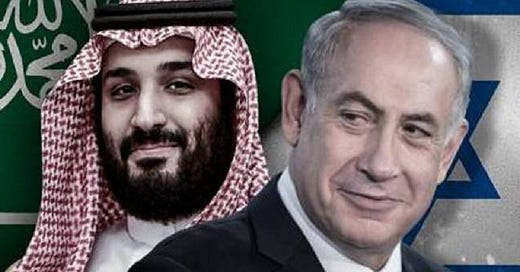The latest regional conflict served to recalibrate Saudi grand strategy towards the West, though this doesn’t automatically preclude its possible membership in BRICS.
Israeli media cited a royal Saudi source who told them that the Kingdom has a system in place “to automatically intercept any suspicious entity in its airspace”, thus explaining the role that they reportedly played in the multinational effort to shoot down incoming Iranian missiles en route to Israel. They also claimed that “That source also charged that Iran had instigated the Gaza war, through its proxy group Hamas, to thwart US efforts for a Saudi normalization deal.”
Saudi Arabia didn’t denounce this report like it would have been expected to do if there wasn’t any truth to it, and a story by the Wall Street Journal several days later lent credence to this claim. They cited American and Saudi officials to report that America is offering the Kingdom a more formal defense relationship alongside a nuclear energy partnership in exchange for recognizing Israel. For its part, the self-professed Jewish State would then recognize Palestinian statehood in this “long-shot plan”.
It’s also important to note that Saudi Arabia officially clarified in mid-January that it hadn’t yet accepted last August’s invitation to join BRICS. This analysis here examined the reasons behind that decision, which included increasing suspicions of Iran given its role in the Red Sea Crisis via its Houthi allies and newfound sensitivities of Western perceptions about its possible membership. RT casually mentioned in in early April that Saudi Arabia is still reportedly considering final ratification of its accession.
Seeing as how the Kingdom has thus far formally remained outside of BRICS while reportedly assisting Israel and its Western allies with intercepting Iranian missiles, there are reasons to believe that it’s in the process of recalibrating its grand strategy due to the consequences of the latest Israeli-Hamas war. Prior to then, it hoped to balance between Iran and Israel, which would take the form of involvement in the North-South Transport Corridor (NSTC) and the India-Middle East-Economic Corridor (IMEC) respectively.
The eruption of the Iranian-Israeli proxy war in Gaza, the resultant Red Sea Crisis, and then those two’s tit-for-tat strikes over the past week rendered these pragmatic plans unfeasible. The first-mentioned conflict delayed the construction of modern IMEC infrastructure, though this route is reportedly being used by China right now to facilitate trade with Israel without transiting the Red Sea. Accordingly, Saudi Arabia couldn’t involve itself in the NSTC without appearing as though it’s subordinating itself to Iran.
If pressed to choose between the two, Saudi Arabia would certainly pick IMEC over the NSTC since it’s poised to place an irreplaceable transit role in the first while only serving as an appendage of the second. These calculations explain why “Saudi Arabia Is Expected To Eventually Resume Its Secret Normalization Talks With Israel” at some future date since IMEC is fundamental to Crown Prince Mohammed Bin Salman’s (MBS) Vision 2030 to revolutionize his Kingdom’s economy while the NSTC is supplemental.
This doesn’t mean that the US’ latest plans to broker an Israeli-Saudi peace deal will succeed, especially since a lot depends on Netanyahu, who remains fiercely opposed to Palestinian independence. What it goes to show is that Saudi Arabia is inclined to accept its part of the reported terms so long as Israel and the US make good on theirs. In other words, the latest regional conflict served to recalibrate Saudi grand strategy towards the West, though this doesn’t automatically preclude its possible membership in BRICS.
Abandoning that association would deprive the Saudis of a seat at the table and the attendant ability to gently counteract certain Iranian initiatives, thus voluntarily ceding influence to the Islamic Republic. Furthermore, the Kingdom wouldn’t be able to coordinate de-dollarization and multilateral non-Western investments as effectively if it officially declined to join BRICS. It’s therefore better to remain ambiguous about this while still participating in group meetings instead of outright rejecting membership.
Of course, it’s also possible that the US might secretly make its reported offer of a more formal defense relationship and nuclear energy partnership conditional on Saudi Arabia declining to join BRICS, though that could backfire if the Kingdom feels that it’s unfair and thus pulls out of the talks in response. At the same time, some members of the royal family might prefer for their country to take that unfair deal than risk losing the historic moment for geostrategically reshaping the region, so it can’t be totally ruled out.
In fact, the Saudis might even counter that they could consider dumping BRICS in exchange for more tangible large-scale IMEC investment promises and the US turning a blind eye towards them secretly enriching uranium for nuclear weapons under the cover of their reported energy partnership. Should that happen, then MBS might feel that such a deal is no longer unfair but finally in his Kingdom’s objective national interests, in which case he could decisively pivot towards the West at Iran’s expense.




